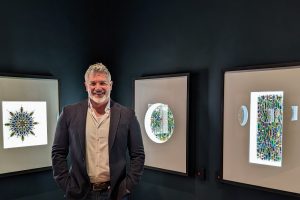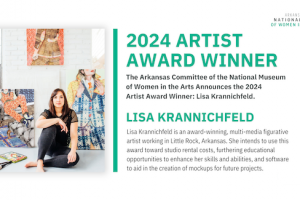Arkansas New Play Fest: a bubbly bash of staged readings and intimate conversations
In an effort to promote and encourage new playwrights and their ideas, TheatreSquared hosted the Arkansas New Play Fest, an event that spanned two weekends; the first at Crystal Bridges and the second at their home theater at Nadine Baum Studios. The set list for the weekend was comprised of four staged readings by student playwrights and one workshop production by The LatinX Theatre Project. The performances were paired with local craft beer and audiences who came to help the plays-in-progress. Robert Ford, the artistic director at T2, explained to the audience that these performances are snapshots of a work in progress.
“I think of it as a picture of an athlete in motion—the work is still moving forward,” Ford said.
Most of the plays were performed on-script and without background props. The lack of decoration allowed the audience to tune in to the story being told and focus directly on the actors and actresses as they played their parts. The key component of the New Play Fest was the ability for the audience to give feedback on the play: what captivated their attention, what did they not understand, and what did they want to see more of?
At the end of each play, Ford brought the playwright and dramaturg down to center stage and prompted the audience to relay their reactions and questions to the playwright. This insider’s peek at the creation process of a successful play gave the audience a sense of agency in the process of honing a work. Many audience members had already seen the readings at their first workshop at Crystal Bridges and on the second weekend of performances, shifts and changes could already be seen based on the commentary of the audience from the week before. The festival allowed young playwrights the chance to expose their work to the NWA community and get traction as young artists.
Friday, April 5
Carlo at the Wedding by Bryna Turner
Bryna Turner’s Carlo at the Wedding was both heart-wrenching and hilarious. The main character, Carlo has been invited to a wedding that is weird for her to be at, considering she’s the bride’s ex-girlfriend. Over the course of the play, Carlo gets to meet other characters at the wedding and gets an intimate look into their relationships. Her heart is both broken further and somewhat healed as she becomes a part of the narrative of misplaced love. Her spunky, satirical sense of humor keeps the audience laughing throughout the play while her pain from her still healing raw heart can be felt deeply by everyone in the audience. Carlo at the Wedding tells a story of unrequited love, the agency we have in the universe, and how loving and losing really can be better than having never loved at all.
Saturday, April 6
Ain’t I A Woman by Na’Tosha De’Von
Na’Tosha De’Von’s one-woman play tells the story of a girl becoming a woman and what is considered normal for women’s journeys. Throughout the play, the audience watches De’Von’s character, Nia, as she writes a book, the chapters being years of her childhood and growth. A grown woman now, Nia writes about what her definition of “woman” is and how she came to understand it through her life experiences. Some of the things she goes through seem to be relatable while others are definitely not in the normal woman’s experience. By doing this, De’Von challenges what experiences we as a society normalize for women and how these assumptions may need revisiting.
He Did It by Rachel Lynett
Rachel Lynett’s He Did It called direct attention to sexual assault and the perpetrators and survivors. Lynett used her work to discuss a sensitive and painful topic without any hesitation. Her play began where many usually end, and Lynett doesn’t spend the whole script discussing whether or not he did it. He did, in fact, do it and her story is about the conversations that happen after that certainty. Lex and Ada, the two creators of a show that is soon to move forward to Showtime, have to decide what they should do after they’re told that Jefferson, their writer, has committed multiple violent, sexual crimes. The harrowing conversation throughout the reading centers around the value of truth and the juxtaposition between “what is right and what is real.”
Sunday, April 7
Blanket Statements by The LatinX Theatre Project
Blanket Statements, renamed Crossroads by the LatinX Theatre Project, depicts a story of duality, liminality, hardship, and family. After crossing the U.S.-Mexico border to follow their dreams and give their child a better life, a young couple realizes that even north of the border, life isn’t a fairytale. Their daughter, Angel, wishes to follow her dreams to be a singer, but also deals with managing who she is as a Mexican-American woman that has never been to Mexico before. The audience follows cyclical path of escape and entrapment in both occupation and identity. Angel discovers more about herself and her heritage and just how that plays into the narrative of understanding what it means to be of two places.
Teen Dad by Adrienne Dawes
Adrienne Dawes’ Teen Dad, tells the story of a family that is healing and dealing their past traumas. Tom and Tanya had their daughter Abby as teenagers at the young ages of 14 and 18. Fifteen years later, Tanya is engaged to John, a social worker and healer that helps her manage her anger and past trauma. On a getaway weekend at a borrowed beach house, Abby surprises her mom with a reunion with Tom and his unknowing girlfriend Alusha. The pandemonium that ensues unearths everyone’s past trauma and demonstrates the messiness and heaviness of unpacking our emotional suitcases. Teen Dad is wildly funny and invites the audience to acknowledge the messiness of real life and the emotional baggage that everyone carries.




Comments